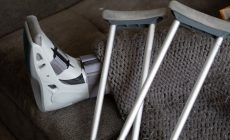SHTF pretty often in hurricane areas, and lately in non-typically hurricane oriented areas (read: Jersey). If you find yourself somehow stuck in one, it’s probably a good time to put to use some of those survival skills tat you’ve been prepping for.
The Almanac gives us this helpful advice for what you should do in case of a hurricane attack.
- Stay informed by monitoring the store via radio, TV, and internet.
- Secure your home, close storm shutters, and secure outdoor objects or bring them indoors. Objects such as lawn furniture, trash barrels, hanging plants, toys, and even awnings can be broken and picked up by strong winds and potentially become a projectile.
- Turn off utilities if instructed to do so. Otherwise, turn the refrigerator thermostat to its coldest setting and keep its doors closed.
- Turn off propane tanks. Avoid using the phone, except for serious emergencies.
- Keep your vehicles fully fueled.
- Have a certain amount of cash available. If power is lost, ATMs may not be working.
- Moor your boat if time permits.
- Ensure a supply of water for sanitary purposes such as cleaning and flushing toilets. Fill the bathtub and other large containers with water.
If you don’t live in an area prone to such things, perhaps you don’t really care how to survive a hurricane. However, if you happen to be on vacation with the missus, a little knowledge might save your live. You can stock up with a hurricane survival kit and gear. Use the following guide to help with tips and tricks.
The Matador network provided a list of things you should do in a hurricane situation while staying at a hotel, which I summarize below.
1. Prepare a disaster plan.
What to do if you’re separated from your traveling partner? Most formal disaster plans are geared for preparing for the natural disasters at home, but they can easily be altered to fit your travel needs. Just use what you’ve already made and tweak it.
2. Meeting Places.
The Red Cross suggests picking two places to meet up with your traveling companions if you’re separated during an emergency. One of these can be obvious, like your hotel, but be sure to have an alternate location in case your hotel is directly affected by the disaster. Don’t forget to also pick a reliable contact back home who you each can call to check in with if you get separated. Better safe than sorry.
3. Communication.
Even if all of your traveling companions have a cell phone, chances are the service might go down in a disaster. Also, after a disaster it’s often easier to make a long distance call than a local call. If you’re traveling solo, keep a contact back home updated on your situation so they can fill in others with the latest information.
Consider survival radios that work on different frequencies.
4. Emergency info.
Have a hard copy of important phone numbers and keep it in an obvious place. Chances are, many of your frequently dialed phone numbers are carefully saved in your cell phone rather than your own memory. Which is fine until a disaster-related power outage happens and suddenly turning on your phone wastes valuable juice.
A hard copy list of important numbers serves two purposes – it’s an additional resource for you, and it’s helpful in case you’re injured and someone needs to know who to call. Write “ICE” – which stands for In Case of Emergency – next to your emergency contacts. If you’re hurt, this will help English-speaking emergency personnel who are trained to look for this information know immediately how to contact the right person.
FEMA has a ready-made card that you can cut out and personalize. If your traveling companion has a cell phone or if you have friends in the area that you’re traveling, specify that clearly next to their names and numbers. When you’re abroad, know the number for emergency services in each country you visit.
5. Carry cash.
Travelers often avoid carrying extra cash because they’re worried about theft. But if you’re stuck in a natural disaster and a power outage occurs, your ATM cards and credit cards may be completely useless. Trying to finding anyone who will exchange a traveler’s check during a crisis may be even more challenging.
You don’t need a ton – better safe than sorry.
6. Learn about your surroundings.
If you’re staying at a hotel or hostel, learn what their emergency plan is, if any. The Red Cross suggests determining the best escape routes and finding two ways out of each room.
Get to know the general area as well. If you had to leave town quickly, what are your options? How could you get to a train or bus station? Carry hard copies of a city map along with your hotel or hostel’s address with you at all times. Learn as much as you can about evacuation routes by listening to news reports and speaking with knowledgeable locals, when possible. Make friends – duh.
7. Keep important documents and extra medical supplies handy.
Important documents can include passport, emergency contacts and numbers including you travel insurance.
The Red Cross suggests including special needs items such as prescription medications, extra eye glasses, and contact lens solution in your Disaster Supply Kit. This is imperative if you want to stay as healthy as possible during a disaster.
If you take a certain medication regularly, plan to bring double the supply, if possible, than you’ll actually need for the length of your trip. That way, if you’re stranded because of a disaster you won’t have to worry about missing doses.
Also, have extra copies of your prescriptions in case you need an emergency refill. Even if you’re not able to fill them abroad, it will help give local doctors information on what you need. Keep photocopies of your itineraries, travel insurance information, passport, etc. in each of your bags. Large, clear bags are great for these, and help protect them from water.
No SASI article would be complete without a video so here you go





















Leave a Reply
Your email address will not be published. Required fields are marked (required)